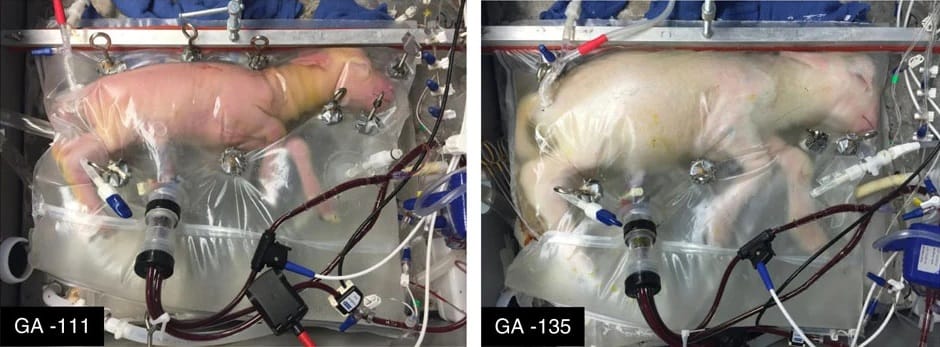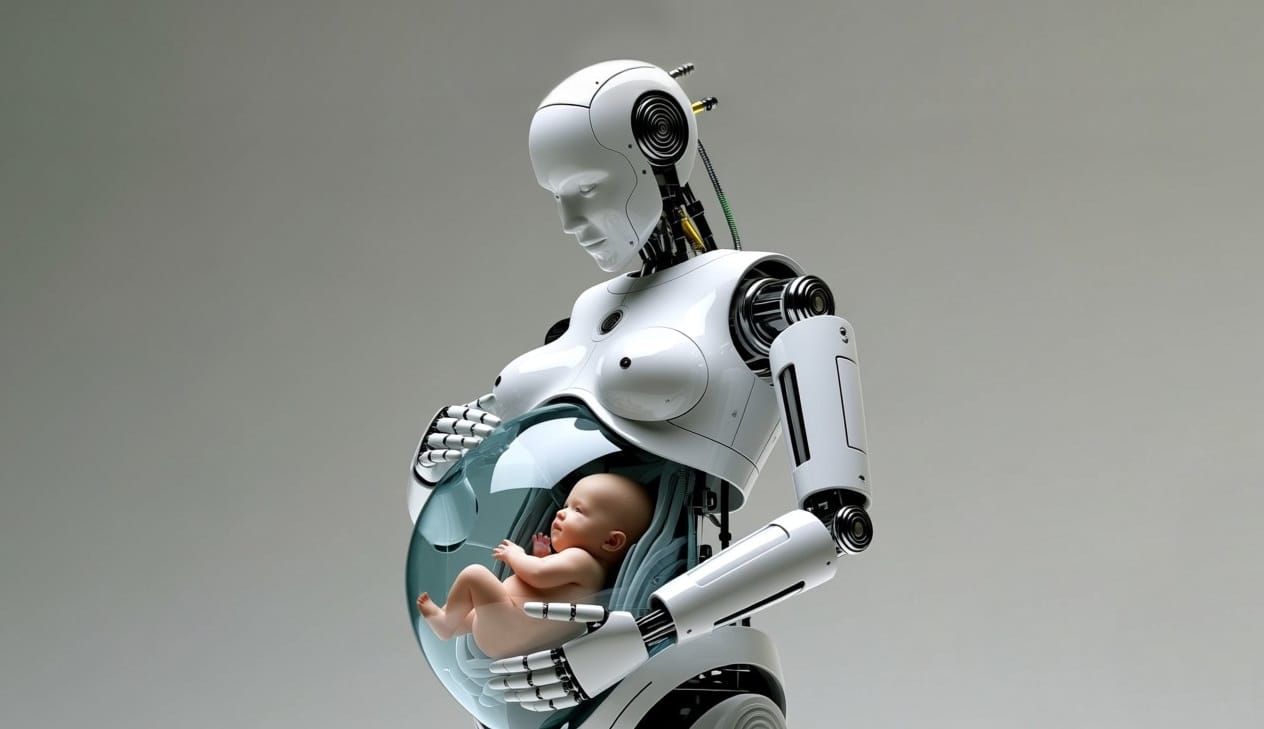In August 2025, the news spread all over the world that a Chinese company was developing an android with an artificial uterus for surrogate pregnancy - it would supposedly be able to provide the entire process, from conception to birth. It is reported that the prototype is expected as early as 2026. We have verified the accuracy of this story.
Both the media and bloggers spoke about the robot, which will supposedly be able to give birth to a human being and will be presented next year. For example, Ruslan Usachev in his video on YouTube (590,000 views at the time of writing this analysis) statedthat a Chinese company based in Guangzhou announced the creation of a humanoid robot for carrying a child at the World Robotics Conference in Beijing. At the same time, different publications called this company something Caiwa, That Kaiwa. It is reported that the project is based on the technology of an artificial uterus - a device that is filled with amniotic fluid, where the fetus is gestated for ten months and receives nutrients from the outside. The cost of such a humanoid robot will allegedly be about ¥100,000 (about $14,000). A photo of the device was not shown anywhere - the illustrations were images generated by neural networks.
The authors of many publications specify that the Chinese company mentioned above was founded by Zhang Qifeng, Ph.D. from Nanyang Technological University (NTU) in Singapore. In the Telegram channel of Ksenia Sobchak “Bloody lady” (238,000 views) the supposed scientist is quoted as follows: “Artificial womb technology has already reached a high level of development, and now it needs to be inserted into the abdominal cavity of a robot so that a real person and the robot can interact and achieve pregnancy, and the fetus can grow inside.”
Similar posts about the Chinese robot also appeared in Telegram channels “Digital magazine"(173,000 views), "Evening Telegram" (146,000), "Technochat"(126,000), Concertzaal (68,000), "Ice cream"(60,000), etc. Among the media, they talked about the supposed high-tech novelty"Russian newspaper", "Gazeta.ru", "Komsomolskaya Pravda", "Pravda.ru" And Mail.ru. The news also spread on VKontakte (examples here, here, here, here And here). In English, publications such as: The Telegraph, New York Post, Newsweek, Vice And Daily Mail.
X World Robotics Conference passed in Beijing from August 8 to 12, 2025, and it was during these days that news appeared on the Internet about the development of an android for bearing a child. For example, on August 11, the Korean website was among the first to write about it Chosun Biz, who referred to an interview with Zhang Qifeng published three days earlier in the Chinese science and technology publication Kuai Ke Zhi. The man was introduced there as a professor and doctor of philosophy from NTU. The article clarified that we are not talking about a separate incubator, but about a humanoid robot with an artificial uterus installed in the abdominal cavity. The description of the device outlined in Chosun Biz generally corresponds to how it was described on the RuNet.

In addition, the Korean site provided several quotes from Zhang, including the one presented in Sobchak’s post. “I initiated the development to solve the problem of population decline,” he allegedly added. “Although commercial surrogacy is illegal, I want to meet the demand of those who do not want to get married but want to have children.” Zhang reportedly did not detail how the eggs would be fertilized and implanted into the robot. According to him, wrote Chosun Biz, the artificial uterus is already showed significant results in animal experiments. So, back in 2017, American scientists published in the journal Nature Communications, a paper on a life support device for very premature newborns that helped lambs survive and develop.

In its material, the Chosun Biz website also named Zhang as the founder of a company that has been engaged in robotics in Hong Kong for more than two years (apparently, they meant the company Kaiwa, which creates sensors and sensors). However, other data are more common. For example, the Hong Kong edition of The Standard wrote, that Zhang's company was founded back in 2015 in Guangzhou. We're talking about Kayiwa - an enterprise that specializes in customizing commercial robots (including androids) for various industries. On website of this company, Zhang is listed as the founder and manager.
However, “Verified” and fact checkers from the American project Snopes and French online edition TF1 Info did not find Kayiwa or Zhang Qifeng in list participants and speakers at the 2025 World Robotics Conference. Moreover, an NTU representative told Snopes that such a person has never studied or worked at this university: “No one named Zhang Qifeng has graduated from NTU with a Ph.D. Our checks also showed that similar research on baby-bearing robots has not been conducted at NTU.”
However, a refutation from Zhang himself appeared on the Chinese segment of the Internet. Thus, the news portal Sina News brought Comment from Kayiwa CEO on August 11. According to Zhang, the media misinterpreted his words from the interview and the company currently has no plans to develop or produce a child-bearing robot. During a discussion of new trends in industry technology, he reportedly said only that "some foreign teams are looking into the development of gestation robots." Zhang also explained that in the interview he mentioned a prototype device that would be released within a year at a price of about ¥100,000, since it was a self-developed android model of the company, but without a built-in artificial womb. According to Zhang, some media outlets failed to report his entire interview, limiting themselves to snippets about the imminent release of a prototype, erroneously linking them to a false claim that Kayiwa would release a humanoid robot for carrying a child. A company representative confirmed the same in an interview with reporters TF1 Info.
Zhang reportedly apologized for the inconvenience caused to the public by the incident and also urged internet users to stop spreading unverified information to avoid further misunderstandings. In addition, he said that representatives of his company have contacted media outlets and platforms demanding that misleading videos and articles be removed. According to TF1 Info, the news about the development of a robot for gestation initially appeared on the Chinese website China News Service, where it was already unavailable. By the time of writing this analysis, their articles were also deleted The Telegraph And The Standard.
According to experts interviewed by French journalists, the development and production of an incubator inside a humanoid robot does not have any practical benefit, and today there is not a single serious article about research in this direction.
Thus, the Chinese company Kayiwa did not announce that in 2026 it would release a humanoid robot capable of bearing a child. Such developments were denied by the founder and head of this company. According to him, fragments of his interview were taken out of context, as a result of which the media misled their readers.
Cover photo: Stable Diffusion / "Verified"
- Is the photo of Elon Musk on a date with a robot girl true?
- Is it true that for the first time in history there was a concert in the United States where a robot sang?
- Is it true that in the movie “Terminator” the artificial intelligence “Skynet” took over the planet in 2024?
If you find a spelling or grammatical error, please let us know by highlighting the error text and clicking Ctrl+Enter.






